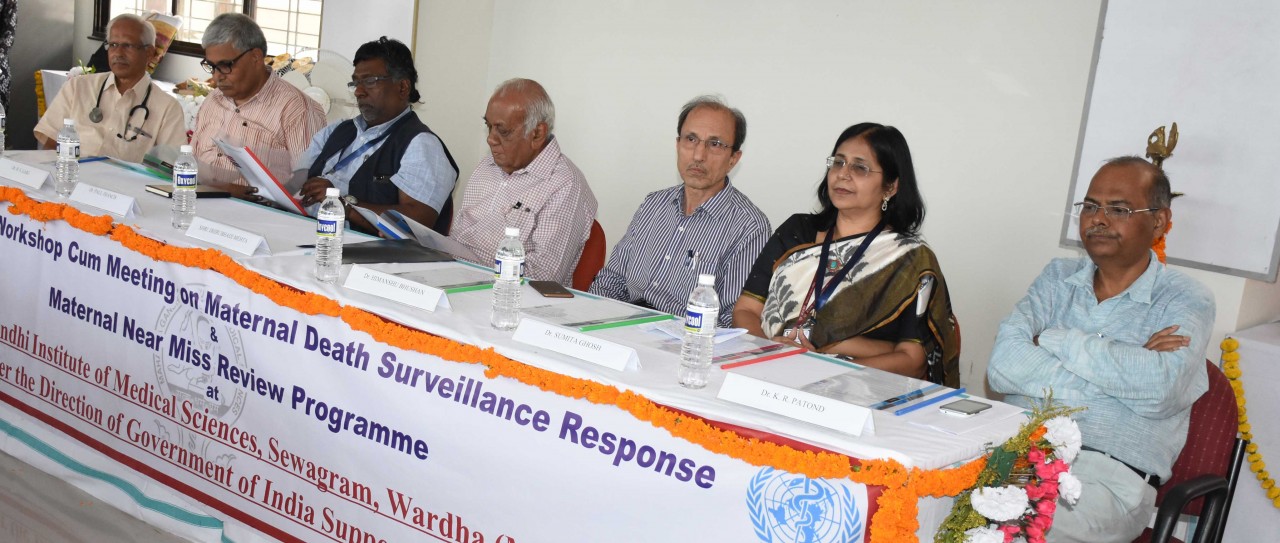Recently, the Ministry of Health and Family Welfare, Government of India scheduled five regional capacity-building workshops for Maternal Death Surveillance and Response (MDSR) and Maternal Near Miss Review at five regional centers. The first workshop, supported by the World Health Organization (WHO), UNICEF and the National Health Systems Resource Centre (NHSRC), was held at MGIMS, Sevagram on 10th and 11 October 2017. Dr. Poonam Varma Shivkumar and Dr. S Chhabra (Department of Obstetrics and Gynecology) coordinated the workshop. Fifty delegates representing the Government of India, WHO, UNICEF, NHSRC and various medical colleges participated in the workshop.
Nearly five women die every hour in India from complications developed during childbirth. Most of these complications are preventable or treatable. The aim of the workshop was to discuss and devise an integrated approach to reduce the burden of maternal death in India.
In the inauguration session of the workshop, Shri Dhirubhai Mehta (President, Kasturba Health Society, Sevagram) welcomed the audience and shared the rich heritage of the institute with the delegates. He also expressed his gratitude to the dignitaries for choosing Sevagram as the launch pad for training the health professionals.
Dr. SP Kalantri (Medical Superintendent, Kasturba Hospital, Sevagram) took the audience on a guided tour of the Kasturba hospital. He explained how the hospital evolved from a 15-bed hospital to a 934-bed tertiary healthcare center. “An unforeseen catastrophic illness is often the last straw that breaks the camel’s back”, he said and explained how the hospital provides the healthcare seekers an affordable, appropriate and accessible medical care.
Dr. S Chhabra, (Director Professor, Department of Obstetrics and Gynecology and Coordinator of the workshop) linked surveillance and response with the various milestones achieved by her department since inception. She narrated how health professionals in Sevagram went beyond their calling– reaching the unreached–and how their collective efforts helped the institute reduce the maternal morbidity and mortality.
Dr. Paul Francis (Technical Officer, WHO) stressed on retrieving the information to prevent the maternal mortality in India. He said that every maternal death has a story to tell and should be counted so that appropriate intervention could be developed to prevent these deaths. WHO is providing technical support for revision of guidelines and scaling up of the maternal death surveillance and response system besides strengthening the quality of training for provision of skilled birth attendance at the delivery sites while also optimising nursing care in the facilities.
Dr. Sumita Ghosh (Deputy Commissioner, Maternal Health Division in Ministry of Health and Family Welfare, Government of India) said that she was glad for choosing MGIMS for the first meeting. “To improve maternal health,” she said, “It is important to identify the barriers that limit access to quality maternal health services and address them at all levels of the health system. Women need not die in childbirth. We must give a young woman the information and support she needs to address her reproductive health needs, help her through a pregnancy, and care for her and her newborn well into childhood.”
Dr. Apurva Ratnu (Maternal Health Consultant, WASH, and UNICEF) explained the WHO near-miss approach. He explained that women who survive life-threatening conditions arising from complications related to pregnancy and childbirth have many common aspects with those who die of such complications.
Dr. Himanshu Bhushan (Consultant NHSRC, Ex-deputy Commissioner, Maternal Health Division, Government of India) said that Government of India initiated Maternal Death Review to identify and assess the gap in programme implementation and take corrective action. “Over the last five decades, MGIMS faculty has shown that a mix of passion and compassion can significantly improve the health of the community. MGIMS has shown that even in a resource-limited setting, a bunch of highly committed individuals can dramatically impact the quality of healthcare,” he added.
During the workshop Dr. Sumita Ghosh, Dr. Himanshu Bhushan, Dr. Suneela Garg, Dr Shakuntala Chhabra, Dr. Poonam Varma Shivkumar, Mr. Prashanth, Mr. Ajit Kumar, Dr. Narender Goswami, Dr. Apurva Ratnu, Dr. Sridhar, Ms. Jashodhara and the faculty from the Department of Obstetrics and Gynaecology and Community Medicine, MGIMS discussed and debated various issues related to the theme of the workshop.
The government of India has adopted the tools developed by the department as national guidelines for Maternal Death Surveillance response and Maternal Near Miss review. These reviews are extremely useful in knowing the reasons for maternal deaths and devising the corrective measures to reach the Sustainable Development Goals for 2025.
The department has been selected as the first nodal center for conducting training in maternal dearth surveillance response. During the workshop various cases of maternal death were discussed and the interactive sessions were done on each case. The team also conducted a field visit to Primary Health Centres, district hospitals and private clinics. Different ways to improve the facilities at all the levels to reducing maternal morbidity and mortality were discussed.
Dr Poonam Shivkumar Varma shared her joy and exclaimed, “As an Obstetrician this workshop brings me immense hope to bring sound maternal health in the community. We aim to create more awareness to reduce maternal morbidity and mortality in the society.”

